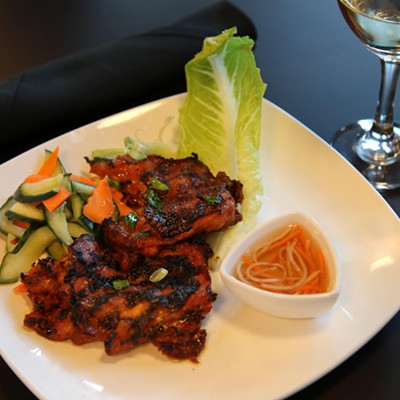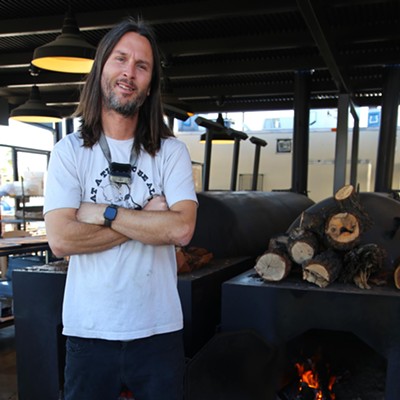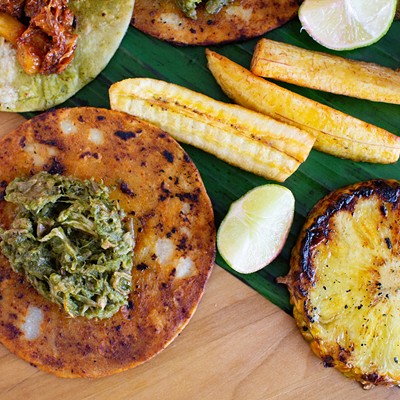THE HOTTEST FAD in cooking shows is a program that most Tucsonans probably haven't seen. It's been variously described as the most entertaining -- not to mention bizarre -- hour in television; a cult-classic cross between American Gladiators and Julia Child, with subtitles. Its fan base is legion and internationally diverse, having spread largely by word-of-mouth and an assortment of websites. The show that's inspired such rapt enthusiasm is Iron Chef, a Japanese-produced television program that blends the disparate elements of game show, cooking tutorial and sporting event into a single package of unique entertainment.
Reportedly, the 6-year-old Iron Chef program permeated the U.S. market through the bootleg underground, spurred on by a rabid fan base that won converts by passing pirate videotapes among friends...which just goes to show the value of knowing important people in low places.
At any rate, for the uninitiated, the premise is: a wealthy, eccentric, flamboyantly dressed gourmand (played by Japanese actor Kaga Takeshi) lives in a medieval castle where he's assembled a coterie of master chefs -- the aptly named "Iron Chefs" of the show's title. Each of the three chefs has mastered a specific cuisine (French, Chinese or Japanese), transforming it into a fine art. Dressed in hues of blue, crimson or gold (somewhat reminiscent of Mighty Morphin Power Rangers), these real-life culinary wizards represent their native land.
Takeshi searches the world over to find worthy chef-challengers to test the skills of this culinary crew. For many fans, the best part of every show is watching Takeshi (looking like a Japanese version of Liberace, dressed in black) mull over the possibilities, usually while sitting in a Masterpiece Theater-style den dimly lit with oil lamps. Having decided, Takeshi waltzes into the kitchen, grabs a sizable yellow bell pepper out of a barrel, and takes a gleeful and vaguely demented bite out of it. This signifies the battle is underway. The challenger is brought to the castle, where his talents (even with the abundance of world-class female chefs these days, the contestants are predominantly male) are pitted against whichever Iron Chef he chooses.
Once assembled in the Kitchen Stadium -- an arena consisting of two semi-circular kitchens that are mirror images of each other -- the combatants are presented with a secret ingredient that must be used in anywhere from four to seven courses. The ingredient is usually revealed with great panache: Takeshi dramatically lifts the cover of a silver cloche dish to expose the featured item. The surprise ingredient can be anything from an essential like rice to items not typically found at the corner grocery store, like live conger eels or beef cheek ("Battle Beef Cheek" ranks as one of the favorite Iron Chef episodes of all time).
The chefs have 60 minutes to work their magic; and with the resonating clang of the Gong of Fate, the battle begins.
In the sporting nature of the program, a pair of announcers provide a play-by-play description of everything the chefs are up to. The commentary is handled by one of Japan's best-known baseball announcers, while the color man is a ringside reporter whose beat used to be professional wrestling.
Once the battle is complete, a panel of four judges (usually fairly famous Japanese personalities, only one of which generally has any background in food) judge the results with no-holds-barred criticism. It's not uncommon to witness a comely actress who, if she approves of the dish set before her, moans in orgasmic pleasure. Nor is it out of the ordinary for a chef to be publicly lambasted for a dish that falls below a judge's standards. No matter what's said, the chef is expected to step forward, smile and bow politely. It's a spectacle both painful and uproarious to watch.
Although I've yet to catch an episode where it happens, I've been told the challenger occasionally wins. For the most part though, the honored Iron Chefs prevail.
The current Iron Chef controversy (aside from the fact that it's only available locally via satellite service) concerns the loss of the original subtitles, which have been substituted for far less amusing voice-overs. These voice actors are nowhere near as funny as the original format. A typical subtitle translation might go something like this: "He looks exactly like a blown-up piece of rice. Ha ha ha. I think so."
The Food Network, which recently started carrying the program for subscribers, received so many complaints about the loss of the subtitles that they're rumored to be preparing a rebroadcast of the dubbed versions with subtitles restored. I can't wait. Late to the Iron Chef craze, I've become a regular -- possibly even a fanatic -- setting aside time each Friday and Saturday night so I don't miss a single episode.
Iron Chef airs at 7 p.m. every Friday and Saturday on the Food Network, available locally through Direct TV. For more information, see www.ironchef.com, or www.foodtv.com.








